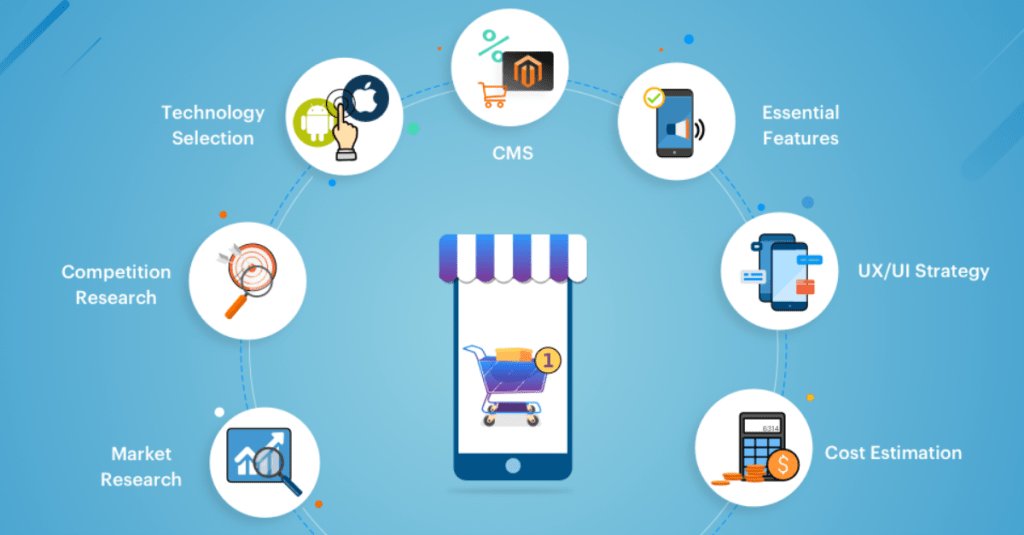Opening a Business Website in 2024:
Outline
Introduction
Significance of Owning a Business Website in 2024.
In the current digital era, possessing a business website has transitioned from being a luxury to an essential requirement. With the ever-increasing number of consumers turning to the internet to find products, services, and information, a robust online presence can significantly impact your business’s success. A well-designed website can serve as a powerful tool to reach a global audience, establish credibility, and drive sales.
Benefits of an Online Presence
The benefits of having an online presence are manifold. It provides 24/7 accessibility to your customers, enabling them to interact with your business at their convenience. A business website also acts as a central hub for your online marketing efforts, including content marketing, social media, and email campaigns. Furthermore, it allows you to showcase your products and services, collect customer data, and offer a seamless shopping experience.
Overview of the Guide
This comprehensive guide aims to help you navigate the process of opening a business website in 2024. From planning and design to SEO and promotion, we will cover every aspect of creating a successful online presence. By following this step-by-step guide, you’ll be well-equipped to launch a website that not only meets your business goals but also stands out in the competitive digital landscape.
Planning Your Business Website

Identifying Your Website’s Purpose
The first step in creating a business website is identifying its primary purpose. Whether you aim to sell products, offer services, or provide information, understanding your website‘s goal will guide its design and functionality. Clearly defining your website‘s purpose helps align your efforts and ensures that your site meets your business objectives.
Conducting Market Research
Market research is crucial in understanding your competition and identifying opportunities within your industry. Analyzing competitors’ websites can provide insights into what works and what doesn’t. Additionally, market research helps you understand your target audience’s needs, preferences, and behaviors, allowing you to tailor your website to better serve them.
Defining Your Target Audience
Knowing your target audience is essential for creating a website that resonates with your visitors. Take into account variables like age, gender, geographical location, interests, and online habits. Creating detailed buyer personas can help you visualize your ideal customers and design a website that addresses their specific needs and preferences.
Setting Goals and Objectives
Setting clear, measurable goals is vital for tracking your website‘s success. Common objectives include increasing brand awareness, generating leads, boosting sales, or improving customer engagement. Define key performance indicators (KPIs) for each goal to monitor your progress and make data-driven decisions to optimize your website‘s performance.
Choosing a Domain Name

Importance of a Good Domain Name
Your domain name is your website‘s address on the internet and plays a critical role in your online identity. A memorable and relevant domain name can enhance your brand recognition and make it easier for customers to find you. Conversely, a confusing or obscure domain name can deter potential visitors.
Tips for Choosing a Domain Name
When choosing a domain name, keep it short, simple, and easy to spell. Steer clear of incorporating numbers or hyphens, as they can make the name more complex. Ensure that the name is relevant to your business and reflects your brand. It’s also wise to choose a domain name that is flexible enough to accommodate future growth and changes in your industry.
Checking Domain Availability
Before finalizing your domain name, check its availability using domain registration websites. If your desired name is taken, consider alternative spellings, synonyms, or adding a relevant keyword. It’s also a good idea to secure multiple domain extensions (such as .com, .net, and .org) to protect your brand.
Registering Your Domain Name
After selecting an available domain name, secure it by registering with a trusted domain registrar. Popular choices for this service include GoDaddy, Namecheap, and Bluehost. Registration typically involves an annual fee, and it’s advisable to set up automatic renewals to prevent losing your domain.
Selecting a Web Hosting Provider

Understanding Web Hosting
Web hosting provides the capability for your website to be reachable on the internet. A web hosting provider allocates space on a server for your website‘s files, ensuring that users can access your site anytime. Choosing the right hosting provider is crucial for your website‘s performance, security, and reliability.
Types of Web Hosting
Shared Hosting
Shared hosting represents a budget-friendly solution where numerous websites distribute resources from a single server. This type of hosting is suitable for small businesses or startups with limited traffic and budget.
VPS Hosting
Virtual Private Server (VPS) hosting offers more resources and control than shared hosting. It partitions a physical server into numerous virtual servers, enhancing performance and offering greater customization capabilities. VPS hosting is ideal for growing businesses that require more stability and flexibility.
Dedicated Hosting
Dedicated hosting allocates an entire server solely to your website, ensuring top-tier performance, security, and control unmatched by other hosting options. It is suitable for large businesses or websites with high traffic and resource demands.
Cloud Hosting
Cloud hosting uses a network of virtual servers to host websites, ensuring scalability and reliability. This type of hosting can handle varying traffic levels and offers excellent uptime. Cloud hosting is suitable for businesses that need flexibility and robust performance.
Criteria for Choosing a Hosting Provider
When selecting a hosting provider, consider factors such as reliability, speed, security, customer support, and scalability. Look for providers that offer features like SSL certificates, daily backups, and easy scalability options. Reading reviews and comparing hosting plans can help you make an informed decision.
Recommended Web Hosting Providers for 2024
Some of the top web hosting providers for 2024 include Namecheap, Bluehost, SiteGround, A2 Hosting, and HostGator. These providers offer a range of hosting plans to suit different business needs, along with excellent customer support and robust performance.
Website Design and Development
Choosing a Website Builder or CMS
Selecting the right platform for building your website is crucial. Website builders like Wix, Squarespace, and Shopify offer user-friendly interfaces and pre-designed templates, making them ideal for beginners. Content Management Systems (CMS) like WordPress, Joomla, and Drupal provide more flexibility and customization options, suitable for more complex websites.
Custom vs. Template Designs
Decide whether you want a custom-designed website or prefer to use a template. Custom designs offer unique branding and tailored functionality but can be more expensive and time-consuming. Templates, on the other hand, are cost-effective and quick to set up, but they may lack originality and customization options.
User Experience (UX) Design Principles
A good user experience (UX) design is essential for keeping visitors engaged and encouraging conversions. Focus on creating a clean, intuitive layout with easy navigation. Ensure that your website loads quickly is accessible to all users, and provides a seamless experience across different devices.
Mobile Responsiveness
With the rising prevalence of mobile gadgets, ensuring your website is responsive on all screens is essential. Ensure that your website adapts to different screen sizes and offers a smooth experience on smartphones and tablets. Mobile-friendly websites also rank better on search engines, improving your visibility.
Hiring a Professional vs. DIY
Decide whether to hire a professional web designer or build the website yourself. Hiring a professional can provide you with a polished, high-quality website but may come at a higher cost. DIY options using website builders or CMS platforms are more budget-friendly and offer the satisfaction of creating your site.
Creating Content for Your Website
Importance of Quality Content
High-caliber content forms the foundation of every thriving website. It helps attract and engage visitors, build trust, and improve your search engine rankings. Invest time in creating well-researched, informative, and engaging content that provides value to your audience.
Types of Content to Include
Include a variety of content types on your website, such as blog posts, articles, product descriptions, videos, infographics, and customer testimonials. Diversifying your content keeps your audience engaged and caters to different preferences and learning styles.
SEO Best Practices for Content
Ensuring your content is optimized for search engines is essential to draw organic traffic. Incorporate appropriate keywords seamlessly throughout your content, encompassing titles, headings, and meta descriptions. Ensure your content is original, high-quality, and provides value to your readers. Incorporate internal and external links to enhance your content’s credibility and user experience.
Content Planning and Scheduling
Create a content plan and schedule to ensure a consistent flow of fresh content. Plan your content around key topics and events relevant to your industry. Use tools like editorial calendars and content management systems to organize and streamline your content creation process.
Implementing SEO Strategies

On-Page SEO Techniques
Title Tags and Meta Descriptions
Create engaging and SEO-optimized title tags and meta descriptions for every page on your site. These elements are crucial for search engine rankings and can significantly impact your click-through rates.
Header Tags
Employ header tags like H1, H2, H3, etc., to organize your content effectively and emphasize key sections. Proper use of header tags improves readability and helps search engines understand the hierarchy of your content.
Keyword Optimization
Conduct keyword research to identify relevant terms and phrases for your content. Use these keywords naturally within your content, titles, and meta descriptions to improve your search engine rankings.
Off-Page SEO Techniques
Backlink Building
Building high-quality backlinks from reputable websites is essential for improving your search engine rankings. Focus on creating valuable content that others will want to link to and consider guest posting, outreach, and partnerships to acquire backlinks.
Social Media Integration
Integrate your website with social media platforms to drive traffic and engagement. Share your content on social media channels and encourage visitors to do the same. Social signals can indirectly impact your search engine rankings and increase your online visibility.
Technical SEO
Site Speed
Ensure that your website loads quickly to provide a better user experience and improve your search engine rankings. Optimize images, use caching, and minimize code to enhance site speed.
Mobile Optimization
Given that most internet users now access websites through their mobile devices, it’s essential to prioritize mobile optimization. Employ responsive design strategies to guarantee that your website performs seamlessly across all screen sizes and devices.
Secure Sockets Layer (SSL)
Implement SSL to encrypt data transmitted between your website and its users. SSL not only enhances security but also boosts your search engine rankings, as Google favors secure websites.
Setting Up E-Commerce Capabilities

Choosing an E-Commerce Platform
Selecting the right e-commerce platform is essential for your online store’s success. Some well-regarded choices are Shopify, WooCommerce (specifically for WordPress), and BigCommerce. Consider factors such as ease of use, scalability, and available features when choosing a platform.
Payment Gateway Integration
Integrate reliable and secure payment gateways to facilitate smooth transactions on your website. Options like PayPal, Stripe, and Square offer secure payment processing and a variety of payment methods.
Product Listings and Management
Organize and manage your product listings effectively. Include high-quality images, detailed descriptions, and relevant keywords to enhance your listings’ visibility and appeal. Use inventory management tools to keep track of stock levels and ensure a smooth shopping experience.
Shopping Cart and Checkout Process
Optimize your shopping cart and checkout process to reduce cart abandonment rates. Ensure the process is simple, user-friendly, and secure. Offer multiple payment options and a guest checkout option to cater to different customer preferences.
Security Measures
Implement robust security measures to protect your customers’ data and build trust. Use SSL certificates, secure payment gateways, and regular security audits to ensure your website‘s safety. Ensure your privacy and security policies are clearly communicated to provide reassurance to customers.
Launching Your Business Website

Pre-Launch Checklist
Before launching your website, complete a pre-launch checklist to ensure everything is in place. This includes testing all links, forms, and functionality, optimizing your site for speed and SEO, and ensuring mobile responsiveness.
Testing Your Website
Ensure comprehensive testing of your website across various browsers and devices to detect and resolve any potential issues. Conduct usability testing to ensure a smooth user experience and gather feedback from beta testers to make necessary improvements.
Going Live
Once you’ve completed all preparations and testing, it’s time to go live. Announce your website launch through email newsletters, social media, and other marketing channels to generate excitement and drive traffic.
Post-Launch Activities
After launching your website, monitor its performance closely. Use analytics tools to track traffic, user behavior, and conversions. Continuously optimize your website based on data and feedback to enhance its performance and user experience.
Promoting Your Website

Digital Marketing Strategies
Content Marketing
Create and share valuable content to attract and engage your target audience. Blog posts, articles, videos, and infographics can drive traffic to your website and establish your authority in your industry.
Social Media Marketing
Leverage social media platforms to promote your website and connect with your audience. Share content, engage with followers, and run targeted ads to increase your online visibility.
Email Marketing
Build an email list and use email marketing campaigns to nurture leads and drive traffic to your website. Offer valuable content, promotions, and updates to keep your subscribers engaged.
Paid Advertising Options
Google Ads
Run targeted Google Ads campaigns to drive traffic to your website. Use relevant keywords, compelling ad copy, and optimized landing pages to maximize your return on investment.
Social Media Ads
Utilize paid advertising on social media platforms like Facebook, Instagram, and LinkedIn. Target specific demographics and interests to reach your ideal audience and drive conversions.
Measuring and Analyzing Results
Use analytics tools like Google Analytics to measure your website‘s performance. Track key metrics such as traffic, bounce rates, and conversions to understand how your website is performing and identify areas for improvement.
Maintaining and Updating Your Website
Regular Content Updates
Ensure your website remains dynamic and captivating through consistent updates to your content. Add new blog posts, update product listings, and refresh outdated information to keep your audience engaged and improve your SEO.
Monitoring Website Performance
Continuously monitor your website‘s performance using analytics tools. Track key metrics and identify any issues that may affect your website’s user experience or search engine rankings.
Backup and Security Measures
Implement regular backups and security measures to protect your website from data loss and cyber threats. Use secure hosting, SSL certificates, and security plugins to enhance your website‘s security.
Adapting to Market Changes
Stay informed about changes in your industry and adapt your website accordingly. Regularly review your content, design, and marketing strategies to ensure they align with current trends and customer preferences.
FAQs
Common Questions About Starting a Business Website
- What is the financial outlay required to initiate a business website?
- The cost varies depending on factors like domain registration, hosting, design, and additional features. A basic website can cost a few hundred dollars, while a more complex site can cost several thousand.
- Do I need technical skills to create a business website?
- What is the typical duration required to develop a business website?
- The timeline depends on the complexity of the website. A simple site can be created in a few days, while a more complex one can take several weeks or months.
Troubleshooting Common Issues
- What if my website is not loading properly?
- Check your hosting provider’s status, clear your browser cache, and ensure there are no coding errors. Contact your hosting provider if the issue persists.
- How do I improve my website‘s loading speed?
- Optimize images, use caching, minimize code, and choose a reliable hosting provider to enhance your website‘s loading speed.
- What if my website is not ranking on search engines?
- Ensure your content is optimized for SEO, build high-quality backlinks, and regularly update your site with fresh content. Utilize search engine optimization tools for pinpointing and resolving any encountered problems.
Conclusion
Recap of Key Points
Creating a business website in 2024 involves careful planning, design, and ongoing maintenance. From choosing a domain name and hosting provider to implementing SEO strategies and promoting your site, each step is crucial for your website‘s success.
Encouragement to Start Your Business Website
Starting a business website can seem daunting, but the benefits far outweigh the challenges. A well-designed website can enhance your brand’s visibility, credibility, and profitability. Embark on your journey today and witness the expansion of your business.
Call to Action
Ready to dominate 2024? Start planning your business website now and take advantage of the opportunities that a strong online presence can offer. With this guide, you’re equipped with the knowledge and tools to create a successful website that stands out in the digital landscape.
#Opening a Business Website in 2024,#Opening a Business Website in 2024,#Opening a Business Website in 2024,#Opening a Business Website in 2024,#Opening a Business Website in 2024,#Opening a Business Website in 2024,#Opening a Business Website in 2024,#Opening a Business Website in 2024,#Opening a Business Website in 2024,#Opening a Business Website in 2024,#Opening a Business Website in 2024,
#Opening a Business Website in 2024,#Opening a Business Website in 2024,#Opening a Business Website in 2024,#Opening a Business Website in 2024,#Opening a Business Website in 2024,#Opening a Business Website in 2024,#Opening a Business Website in 2024,#Opening a Business Website in 2024,#Opening a Business Website in 2024,#Opening a Business Website in 2024,#Opening a Business Website in 2024,
#Opening a Business Website in 2024,#Opening a Business Website in 2024,#Opening a Business Website in 2024,#Opening a Business Website in 2024,#Opening a Business Website in 2024,#Opening a Business Website in 2024,#Opening a Business Website in 2024,#Opening a Business Website in 2024,#Opening a Business Website in 2024,#Opening a Business Website in 2024,#Opening a Business Website in 2024,
#Opening a Business Website in 2024,#Opening a Business Website in 2024,#Opening a Business Website in 2024,#Opening a Business Website in 2024,#Opening a Business Website in 2024,#Opening a Business Website in 2024,#Opening a Business Website in 2024,#Opening a Business Website in 2024,#Opening a Business Website in 2024,#Opening a Business Website in 2024,#Opening a Business Website in 2024,
#Opening a Business Website in 2024,#Opening a Business Website in 2024,#Opening a Business Website in 2024,#Opening a Business Website in 2024,#Opening a Business Website in 2024,#Opening a Business Website in 2024,#Opening a Business Website in 2024,#Opening a Business Website in 2024,#Opening a Business Website in 2024,#Opening a Business Website in 2024,#Opening a Business Website in 2024,
#Opening a Business Website in 2024,#Opening a Business Website in 2024,#Opening a Business Website in 2024,#Opening a Business Website in 2024,#Opening a Business Website in 2024,#Opening a Business Website in 2024,#Opening a Business Website in 2024,#Opening a Business Website in 2024,#Opening a Business Website in 2024,#Opening a Business Website in 2024,#Opening a Business Website in 2024,






Comments (2)
Julius opolot
Very good content bro, keep on adding more and more keep it up.
ASHA DIGITARY
Thank you!